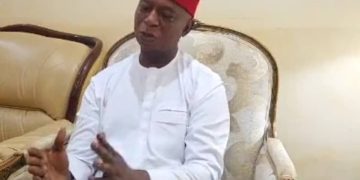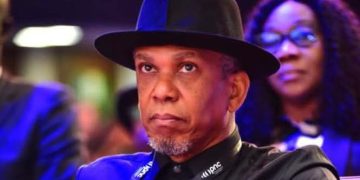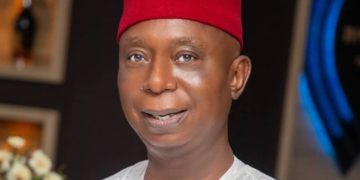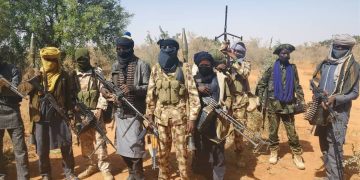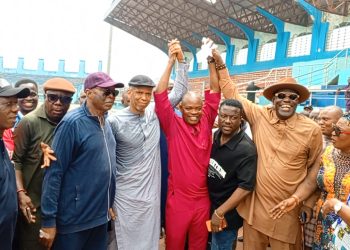By Azuka Chiemeka
Since Amaju Pinnick has opted out of re-contesting as President of the NFF, one would have expected that the orchestrated media attacks should abate and the energy of the ministerial mob channelled to new challenges.
However, there is nothing wrong with compiling the scorecard of a public office holder as Ronke Ogunleye set out to do in her piece titled: “The Amaju Pinnick’s Scorecard We Never Prayed To Have”.
But in doing so, facts must be facts and not be jaundiced and garnished with incorrect assertions, untruths and half-truths as the writer has done, obviously with the objective of continuing to injure Pinnick’s personal reputation.
While Nigerians are understandably unhappy with the early exit of the Super Eagles at the last AFCON and their non-qualification for the Qatar 2022 World Cup, we must be reminded of the interference of the Minister of Sports in the sacking of Gernot Rohr and the recruitment of new coaches, shortly to those events, which put the team in jeopardy.
The fact is that all that Pinnick needed to do, from the point of administration and provision of all logistics the team needed in terms of welfare, he did. What he did not do was get into the field to play.
On the contrary and as someone pointed out somewhere, while the Ghanaian government provided $3.5m for the Black Stars for the final encounter in Abuja, our ministry did not make any effort to provide a kobo.
Besides, Ibrahim Galadima who headed the Ministerial/Presidential 10-Year Football Development Masterplan, and whom Ronke praised so much in comparison, was also he who earlier led us to lose the qualification for the 2006 FIFA World Cup in Germany. He told us then that the World Cup qualification was not our birthright.
Ronke’s assertion that Pinnick had only three international trophies in eight years is particularly not correct.
Under Pinnick, the national teams won many trophies. These include three AWCON in 2014, 2016 and 2018; the FIFA U-17 World Cup in 2015; the African U-23 Nations Cup; the Africa U-20 Nations Cup; women’s football gold in the 2019 Africa Games in Morocco; the WAFU U-17 in 2018 and 2022; and the WAFU U-20 Championship in 2022, bringing it all nine, to three times the number Ronke gave.
Other laurels under the regime include third place in the 2019 AFCON; silver medal in CHAN 2018 and bronze medals by the men’s team in two editions of the Africa Games after the men and women teams failed to qualify for the 2011 edition.
Particularly noteworthy is the Olympic bronze medal at the Rio 2016 Games. Who can forget all that the immediate past Minister of Sports, Solomon Dalung, did to frustrate the team during their preparations? At least we can all remember “what are there for?” and “the money spended was well spended”.
Despite all that, football became the only sport to produce a medal at the Rio Games. Before then, the entire Team Nigeria did not get a single medal at the London 2012 Olympic Games. Both the men’s and women’s national teams under Maigari also did not qualify for the games. But the men’s team qualified for Rio 2016 and won the only bronze for Nigeria, under Pinnick.
It is also incorrect to say that the national women’s U-20 team did not qualify for the World Cup for a long time.
They were in Papua New Guinea in 2016. They were in France in 2018. We may all still remember when the then Minister of Sports had the players kneeling down before him to receive their camp allowances after the ministry had sidetracked the NFF in the funding of the team. They have also just returned from the 2022 edition held in Costa Rica and there was no competition in 2020 due to Covid.
The men’s U-20 team was also in Poland in 2019 and they recently qualified for the Africa tournament which leads to the next edition in Indonesia.
Talking about non-qualification for AFCON, Ronke forgot that the first fall was towards Gabon 2012, under Maigari with Samson Siasia as a coach.
The failure to qualify in 2015 can also be traced to the upheavals in our football at that time, as Solomon Dalung kept destabilising the NFF for the whole of his ministerial tenure.
The first crucial match of that qualifiers was in Calabar with the Chris Giwa faction of the NFF presiding. That marked the beginning of the failure.
The point is while we must criticise, even hate, we should also be truthful about the circumstances and be able to speak to the destabilising factors, especially as occasioned by the wantonness of Sports Ministers against the NFF, otherwise, we would be deceiving ourselves, perhaps just to curry the favour of the ministers which in all essence amount to nothing.
Have we forgotten how Dalung and his cohorts kept the NFF and the LMC in court for almost four years, even instigating the EFCC, ICPC and Presidential Investigatory Panel on Corruption led by Obono Obla to seize his personal properties on flimsy, trumped-up allegations?
That also brings us to the issue of the Nigeria Professional Football League which Ronke says was good during Maigari and bad during Pinnick.
No doubt, our league presently presents much more to be desired. It was for the same concern that Maigari acceded to the formation of the League Management Company under the ministerial tenure of Bolaji Abdullahi.
The LMC under the chairmanship of the respected Nduka Irabor sprang up from then unto Pinnick’s tenure. Nigerians can attest to the fact that until about 2017 when Supersport pulled out of the production, transmission and broadcast right of the league due to difficulties in the operating economic environment, there was an upsurge in its visibility, integrity and commercial standing.
But as somebody pointed out somewhere, the league cannot be an island. We must be honest to understand that it cannot succeed without the corresponding vibrancy and synergy with complementary business and economic sectors. Sadly, the complementary sectors are doing even worse than the football sector itself.
As has been noted, there is no indigenous broadcast organisation that has the technical capacity to produce a game to global TV standards nor can afford to pay global standard broadcast rights fees for the league. This is in addition to other infrastructural and political deficits and even managerial facades by the club owners.
The point is that we deceive ourselves by thinking that the domestic league can compete globally when those complementary sectors of the economy and other requisite factors are in shambles.
On this, Nigerian journalists should better seek to understand and express the real issues, rather than playing to the gallery.
As they say, the world is a stage. Pinnick has come, has played his part and is out. Apart from some of the on-pitch misfortunes of the national teams, he has been the best so far in terms of marketing and commercial management by which he provided about 70% of the funding of our football through sponsorship and brand marketing.
This is a legacy that, if the incoming President of the NFF can sustain will continue to relieve government against competing demands for funding.
In all of this, there is the judgement of man and the judgement of time.
• Chiemeka is the current Chairman of the Sports Writers Association of Nigeria (SWAN), Delta State Chapter



